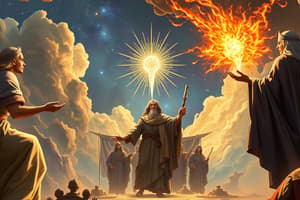Podcast
Questions and Answers
What type of powers are explicitly granted to Congress by the Constitution?
What type of powers are explicitly granted to Congress by the Constitution?
- Expressed Powers (correct)
- Inherent Powers
- Reserved Powers
- Implied Powers
What are Implied Powers?
What are Implied Powers?
The powers assumed by the government that are not specifically listed in the Constitution.
What are Inherent Powers?
What are Inherent Powers?
Those delegated powers of the Constitution that are assumed to belong to the national government because it is a sovereign state.
What are Reserved Powers?
What are Reserved Powers?
What is Concurrent Power?
What is Concurrent Power?
What is the Full Faith and Credit Clause?
What is the Full Faith and Credit Clause?
Why did the Framers choose federalism?
Why did the Framers choose federalism?
What powers does the national government have?
What powers does the national government have?
What powers do state governments have?
What powers do state governments have?
What powers are shared by both the national government and state government?
What powers are shared by both the national government and state government?
How does the Constitution limit the powers of the state and national governments?
How does the Constitution limit the powers of the state and national governments?
How does the Constitution guide the relationships between the nation and the 50 states?
How does the Constitution guide the relationships between the nation and the 50 states?
Which philosopher believed that dividing power between different parts of government was the best way to defend people's freedom?
Which philosopher believed that dividing power between different parts of government was the best way to defend people's freedom?
Powers considered to be logical extensions of those powers specifically listed in the Constitution are called ____.
Powers considered to be logical extensions of those powers specifically listed in the Constitution are called ____.
Collecting taxes, building roads, borrowing money, regulating education, and establishing courts are ____.
Collecting taxes, building roads, borrowing money, regulating education, and establishing courts are ____.
Why is Article VI of the Constitution called the Supremacy Clause?
Why is Article VI of the Constitution called the Supremacy Clause?
Why is Article IV of the Constitution, often called the Full Faith and Credit Clause, important?
Why is Article IV of the Constitution, often called the Full Faith and Credit Clause, important?
What is Dual Federalism?
What is Dual Federalism?
What is the Doctrine of Nullification?
What is the Doctrine of Nullification?
What is the Doctrine of Succession?
What is the Doctrine of Succession?
What is Cooperative Federalism?
What is Cooperative Federalism?
What is Creative Federalism?
What is Creative Federalism?
Flashcards are hidden until you start studying
Study Notes
Powers of Government
- Expressed Powers: Powers specifically granted to Congress by the Constitution, ensuring clarity in federal authority.
- Implied Powers: Assumed powers not explicitly listed in the Constitution, allowing for flexibility in government functionality.
- Inherent Powers: Powers assumed to belong to the national government as a sovereign state, essential for its existence and operations.
- Reserved Powers: Powers not granted to the federal government nor denied to the states, enabling state autonomy.
Shared and Concurrent Powers
- Concurrent Powers: Shared powers between federal and state governments, including the ability to collect taxes and provide for citizen welfare.
- National Government Powers: Authority to borrow and coin money, conduct foreign relations, raise and support armies, declare war, regulate commerce, and manage immigration.
- State Government Powers: Responsibilities include drawing electoral district lines, conducting elections, maintaining state militias, and ratifying Constitutional amendments.
Federalism and the Constitution
- Federalism Choice: Framers opted for federalism to unify states while allowing them self-governance, balancing central authority and state rights.
- Constitutional Limits: The Bill of Rights restricts national powers, and states cannot coin money or engage in foreign treaties.
- Intergovernmental Relationships: The Constitution outlines responsibilities and relations between the national government and the states.
Historical Concepts and Philosophies
- Baron de Montesquieu: Philosopher advocating that dividing power among government branches protects individual freedoms.
- Dual Federalism: (1790-1930) Era where state and national governments operated independently, resembling a "layer cake" structure.
- Cooperative Federalism: (1930-1960) Period of shared authority between state and national governments across various policy areas, described as "marble cake" federalism.
- Creative Federalism: (1960-1980) National government funneled funds to local governments and groups, focusing on local problem-solving.
Important Constitutional Articles
- Supremacy Clause (Article VI): Establishes that national laws take precedence over state laws, ensuring federal authority.
- Full Faith and Credit Clause (Article IV): Mandates states honor each other's acts and proceedings, promoting interstate cooperation.
Controversial Doctrines
- Doctrine of Nullification: Belief that states could invalidate federal laws perceived as unjust or unconstitutional.
- Doctrine of Succession: Idea that a state could legally withdraw from the Union, reflecting tensions during historical conflicts.
Studying That Suits You
Use AI to generate personalized quizzes and flashcards to suit your learning preferences.




